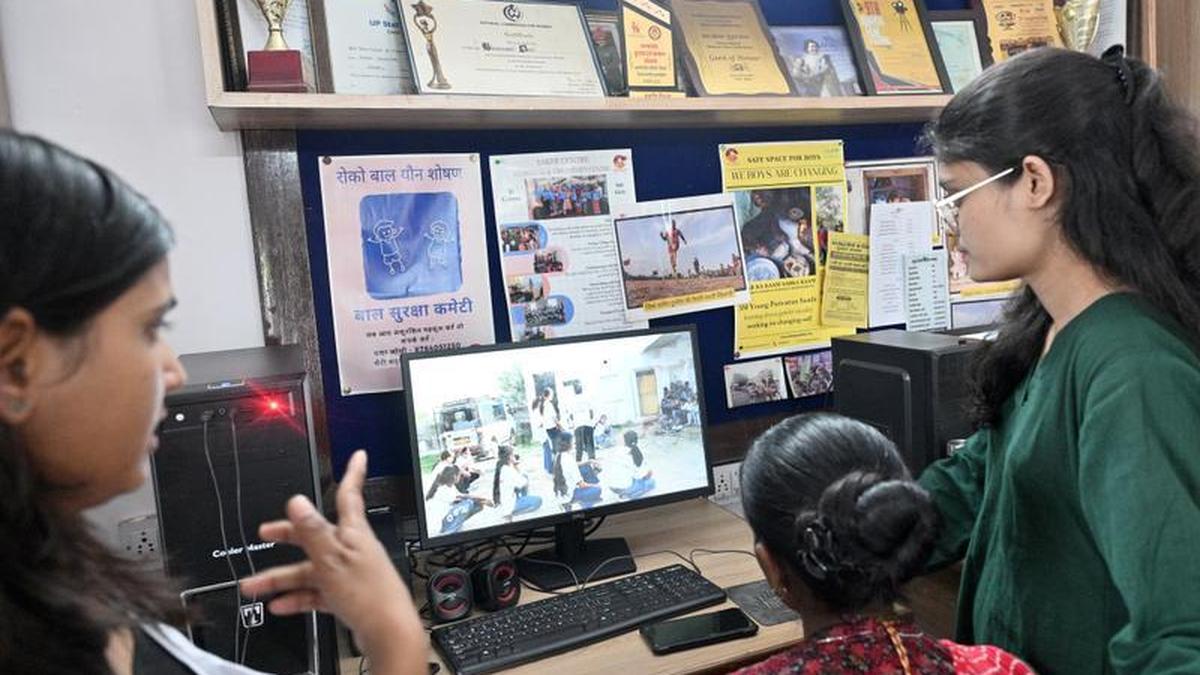Every morning, a quiet revolution unfolds inside a modest two-storey building in Rajasthan’s Ajmer.
Women of all ages, once bound by the shackles of child marriage, now walk into the office of the Mahila Jan Adhikar Samiti (MJAS), an NGO dedicated to empowering women and girls. Some pick up cameras and head out to shoot, while others settle in front of computer screens to edit their films. Together, they are scripting new futures – one frame at a time.
At the office, over 30 women are learning the craft of filmmaking and editing. Many are the first in their families to hold a camera and turn the lens on the world they inhabit.
The NGO – founded in 1997 and based in Ajmer, Tonk, and Bhilwara districts of Rajasthan – emerged from grassroots movements led by women who fought for land rights and against caste discrimination, child marriage, and honour killings.
Today, it has a strong presence in several blocks across the three districts, focusing on digital literacy, leadership programmes, and awareness initiatives on gender equality and domestic violence. MJAS has built deep connections with the women in these areas, providing them with a platform to voice their concerns and drive positive change in their lives and communities.
The filmmaking course is part of MJAS’s efforts to empower rural women with skills for the digital age. The course, initially taught by Anhad Films, has successfully transitioned to a peer-led model, where trained women now teach and mentor others.
Inside the edit room, Manju Rawat, 19, concentrates on her desktop. Clips of a film she is editing appear on the screen. When she joined the NGO in 2023, her only goal was to gain digital literacy. However, when it decided to teach filmmaking, including lessons in scripting, interviewing, and camera work, it piqued her interest. “When I first stepped out of my house to learn how to use a computer, everyone laughed at me. My family and neighbours would say, ‘Dekho kaise daud rahi hai idhar udhar (See how she is running around).’ But I chose not to get affected,” she recalls.
Hailing from a conservative family that fixed her marriage to a 20-year-old when she was just four, Ms. Rawat persisted and kept walking daily to the NGO’s office in Ajmer to hone her skills. Her early films turned the camera towards women like herself, married off at a young age but striving for more. “I was rejected by my in-laws on the day of my gauna (consummation of marriage) due to my short height, but some of my peers had started living with their in-laws. I wanted them to talk about their joys, struggles, and dreams for their children.”
Ms. Rawat and her sister, Sanju, 19, have shot a film on the lives of daily wage workers of Ajesar village in Ajmer.
Across the room sits Bhagwati Devi, 24, who was married at 15 and travels nearly 30 km every day from her village, Bhawani, to Ajmer. “My 17-year-old sister and I were married off at the same mandap (marriage venue) to save money. When I said I wanted to learn filmmaking, my in-laws did not support me,” she says.
Today, Ms. Devi has made films on the practice of wearing the ghoonghat (veil) and on the Ghumantu tribe, a nomadic community that is excluded from welfare schemes due to a lack of documents.
All women pursuing the course have made at least one film, but say they often face resistance from men in the field. Early this year, Santra Chaurasia, 23, Ms. Devi, and two others were hired to film a wedding in Kishangarh – their first professional project.
While the women were welcoming and happy to see them filming, “men kept giving us instructions, refusing to take us seriously”, Ms. Chaurasia recalls.
‘Collective victory’
Despite many such challenges, solidarity keeps them going. “When someone misses classes, we visit their home to check on them. We want to make sure no one drops out because of family pressure,” says 22-year-old Mary.
They are all eager to encourage more women to step out of their homes. “Earlier, I was the only one in my colony to leave home to learn editing. Now, several women have joined me. This is our collective victory,” says Namira Banu, a 21-year-old trainer.
Published – October 07, 2025 12:49 am IST

